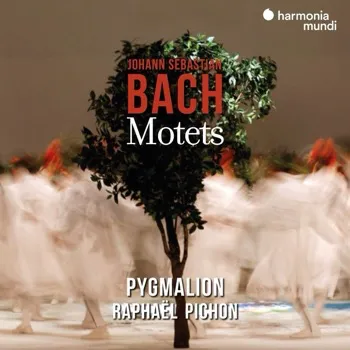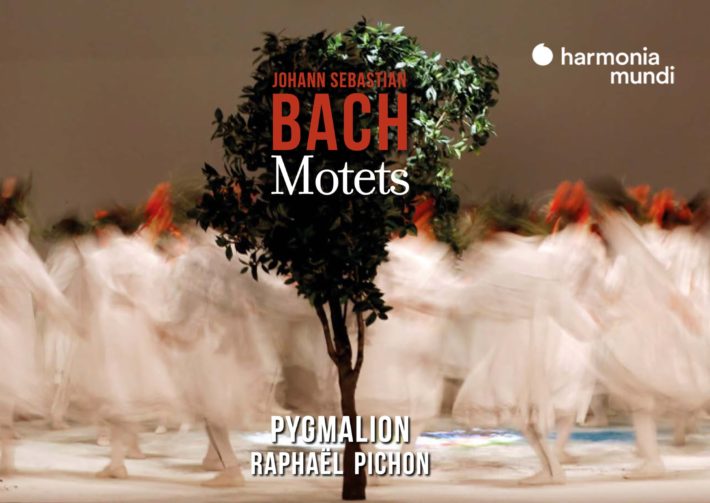J.S. Bach’s six authenticated motets are perfectly crafted, audacious, and mesmerizingly inventive, fully conveying the emotional and theological import of their text. They also demand extraordinary virtuosity from the singers, a requirement fully met in this new recording.

Ensemble Pygmalion and Raphaël Pichon have released few previous Bach albums, including excellent performances of the four Missae Breves (BWV 232-236) and the reconstructed “Köthener Trauermusik” Bach composed for Prince Leopold of Anhalt-Cöthen. In this recording the choir numbers 23-28 singers, depending on the motet, accompanied by a six-player continuo group that includes theorbo and lute. The choral singing is exceptionally fine: balance within and between each section is unnervingly unanimous, and intonation is flawless. The polyphony is performed with a crystalline clarity and there is masterly control of dynamic shading. In short, the choral sound is refined, refulgent and consistently beautiful.
Even more impressive is the potent energy brought to each performance. There is an audible sense of enjoyment that suggest these performers not only love the music, but also love performing together. Their meticulous attention to diction ensures not only textual clarity, but often adds a joyful, almost rambunctious percussion effect to the music. This does not mean everything is necessarily loud: the opening of BWV 228 achieves these qualities with soft, almost whispering execution, followed by a faster than usual segment (2’03”). Rarely does one hear Bach’s music dance so well.
The program opens with a performance of “Lobet den Herrn alle Heiden”, sung with a tripping buoyancy of exuberant praise. Gardiner’s recent recording is also joyful, but a bit gruffer. The difference lies in style of dance each group evokes: Gardiner’s dancers are a bit heavy-footed and stern, whereas the Ensemble Pygmalion is graceful ballet. “Komm, Jesu, komm” is sung with fervency and impressive sensitivity to the text’s ever-changing sentiments. Listen to the suspenseful opening, or to the mounting desperation of “Come, I will give myself to you” (track 3, 2’10”), followed by the sense of relief felt at “we give ourselves into your hands.”
“Der Geist hilft unser Schwachheit” (track 4), written for the funeral of Johann Heinrich Ernesti, Rector of the Thomasschule, sets passages from the eighth chapter of Romans and the third verse of Luther’s chorale, “Komm, Heiliger Geist.” Scored for double choir, Harmonia Mundi’s sound is impressive, the engineers ensuring we hear two distinct choirs, especially with headphones. Once again, the opening sixteenth-note melismas dance with gladness, the singers thanking the Holy Spirit for its many gifts. As the text moves from pleading to assurance, Bach melds the two choirs into one for the final fugue, followed by Luther’s chorale, sung with great tenderness and beauty of tone.
“Jesu, meine Freude,” perhaps Bach’s best-known motet, receives a thrilling reading. Divided into eleven movements, the chiastic structure alternates between chorale stanzas and verses from the book of Romans. This is music of constantly shifting moods and textures, sung here with a precision and clarity that serves to connect the listener more fully with the text’s emotional and theological significance.
An added attraction is the three companion motets Pichon has chosen to fill out the album. During Bach’s Leipzig tenure he often performed motets from the “Florilegium Portense.” This anthology was an indispensable collection in central Germany, containing over 350 Latin texted works by the leading Italian and German composers of the sixteenth century. Pichon chooses motets by Bertulosi, Gallus and Gabrieli, so that we recognize connections between this music and the motets of Bach. Bertulosi’s little-known “Osculetur me,” setting a text from the Song of Songs, is an exquisite gem. All three motets receive the same attention to detail, impassioned singing and textual sensitivity heard in the Bach scores.
The recording is first-rate, clear with just enough room ambiance to warm the choral sound and with a well-balanced continuo group. Pichon’s thoughtful introductory notes clearly show his love of this music, and there is another short but erudite introduction to each motet by the Bach scholar Peter Wollny. Full texts are provided in German, French and English. We can only hope that Harmonia Mundi will record more Bach with these performers soon – strongly recommended.
Bach – Motets BWV 225-230
Ensemble Pygmalion
Raphaël Pichon – Conductor
Harmonia Mundi, CD HMM902657




















